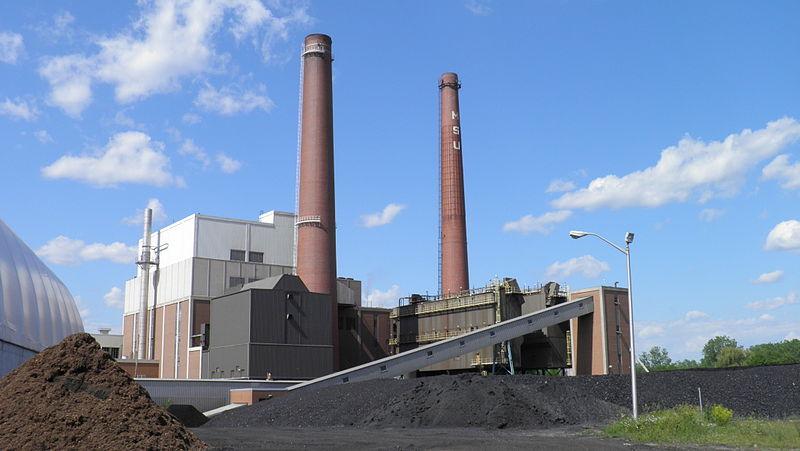Proposed EPA regulation will make it difficult for new coal power plants to be approved
The T. B. Simon Power Plant at Michigan State University provides electricity, heating, cooling and water to the East Lansing campus of Michigan State University. Its primary fuel is coal. (Photo by Michael P. Kube-McDowell via Wikimedia Commons, cc-by-sa
Coal is the number one source of our nation’s electricity, but is also, by far, the number one source of climate changing carbon dioxide emissions.
New pollution regulations from the EPA may change the country’s ability to rely on coal to generate power, in the future. Five years ago the U.S. Supreme Court ruled the EPA could regulate carbon dioxide as a pollutant, and this past week, that’s just what the agency did.
The EPA’s proposed regulations would only affect new coal power plants, not the 600 currently in operation. Still, the new standards would be among the biggest changes in U.S. environmental law, ever.
Eric Schaeffer, an EPA official monitoring the Clean Air Act under the Bush Administration and now the head of EPA watchdog group, the Environmental Integrity Project, said the EPA’s rules amount to a serious change.
“It means that you can’t build a new coal plant in the U.S. unless you remove a significant amount of the carbon, it’s a big deal,” he explained.
But there are a number of exemptions in the rule. For example, companies that are holding a permit to build a new plant, have one year to get started and avoid the new regulations. About 15 plants are in that category. Another exemption is existing coal plants that are reconstructed or modified to beef up capacity are not subject to the new standard.
“And a lot of coal companies do that, a lot of utilities do that, they’ll take an old unit and they’ll refurbish it and boost the capacity so that it comes back to life bigger and stronger than it was,” Schaeffer said.
While the regulations will make major changes, there’s reason to believe not many new coal plants would be built right now, primarily because the abundance of cleaner natural gas has driven the price down dramatically.
“About three years ago, we were looking at a wave of applications to build coal plants, there were applications going in all across the United State to build very big coal plants. Most of those have fallen by the wayside,” Schaeffer said. “Most of the collapse in that market for new coal plants came about because gas got cheaper and cheaper. It no longer made sense to build a big coal plant with gas prices so low. And renewables are more and more competitive.”
Under the bill, coal plants will be allowed to have higher emissions if they capture and bury underground the carbon they’re producing — though there’s no commercially viable system to do that today.
That’s also helped make gas plants seem much more economical, despite a provision in the bill that allows power companies to determine their average annual emissions over the course of 30 years. That means they can have above-allowable emissions today if they can have below-allowable emissions later — for example when carbon sequestration technology is more viable.
“The economics aren’t there and the prospect of trying to site a large carbon sequestration plant near everybody’s groundwater where people are going to have questions where the carbon is going and how long it can be safely stored and, what’s it going to do to the water supply. You could imagine what those fights would be like,” Schaeffer said.
So the market for new coal plants may be on its death bed, but Schaeffer said coal will remain an important source of American energy, especially because of the provision that allows existing coal plants to be expanded and not be subjected to new regulations.
“I would expect to see that happen, to continue to happen, at a number of large coal plants,” he said. “We won’t see new ones, but we’ll see existing plants, the ones that survive, generating more than they do today.”
